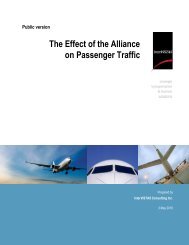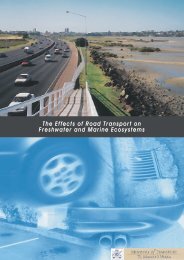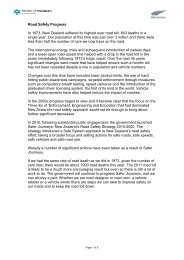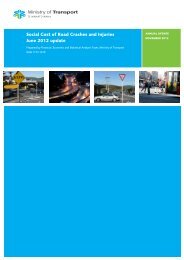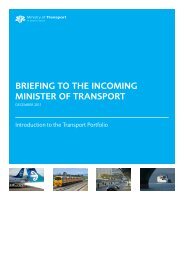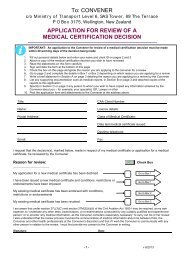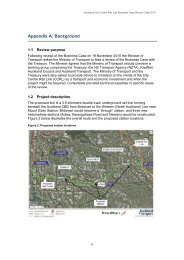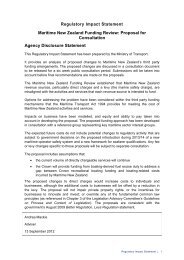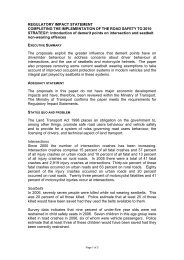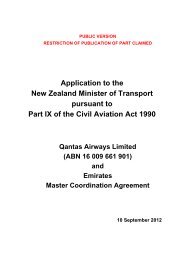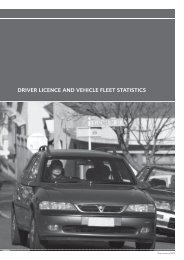National Freight Demands Study - Ministry of Transport
National Freight Demands Study - Ministry of Transport
National Freight Demands Study - Ministry of Transport
You also want an ePaper? Increase the reach of your titles
YUMPU automatically turns print PDFs into web optimized ePapers that Google loves.
<strong>National</strong> <strong>Freight</strong> <strong>Demands</strong> <strong>Study</strong><br />
Executive summary<br />
E1 The importance <strong>of</strong> the freight sector<br />
The movement <strong>of</strong> freight plays a vital role in sustaining and supporting economic<br />
development and contributes to the high quality <strong>of</strong> life experienced by New Zealanders.<br />
The freight sector is an essential component <strong>of</strong> export industries, linking areas <strong>of</strong><br />
production to the ports where goods are sent overseas and its costs form a component<br />
<strong>of</strong> the overall costs <strong>of</strong> supplying world markets. An efficient freight industry can provide<br />
cost-effective forms <strong>of</strong> transport improving the overall competitiveness <strong>of</strong> New Zealand<br />
exports.<br />
The freight sector also supports a wide range <strong>of</strong> domestic activities including:<br />
linking suppliers <strong>of</strong> raw materials with the industries that use or process their goods<br />
transporting semi-finished components within the manufacturing sector<br />
distributing finished products to consumers, including deliveries to the full range <strong>of</strong><br />
retail outlets<br />
supporting household activities through for example the transport <strong>of</strong> waste,<br />
household deliveries and removal services.<br />
The movement <strong>of</strong> freight touches almost all sectors <strong>of</strong> the economy and household<br />
activities and a loss <strong>of</strong> efficiency for the freight sector can have widespread impacts. In<br />
addition the freight sector is a significant consumer <strong>of</strong> energy resources, accounting for<br />
about 43 percent <strong>of</strong> the energy consumed by the transport sector and a similar<br />
proportion <strong>of</strong> greenhouse gas emissions. In support <strong>of</strong> its sustainability objectives, the<br />
government has set targets for the freight sector seeking to increase the modal shares<br />
for rail and coastal shipping in order to reduce the freight sector‟s energy use and<br />
emissions.<br />
The information available on the overall patterns <strong>of</strong> movements and activities <strong>of</strong> the<br />
freight sector is however very limited. This constrains the efficient use <strong>of</strong> resources by<br />
those providing infrastructure and services and also restricts the government‟s ability to<br />
plan for and manage the sector.<br />
The government recognises the importance <strong>of</strong> the freight sector and the desire to<br />
improve its efficiency and achieve significant changes in modal shares. The <strong>National</strong><br />
<strong>Freight</strong> Demand <strong>Study</strong> was therefore commissioned in early 2008 by the <strong>Ministry</strong> <strong>of</strong><br />
<strong>Transport</strong> (MoT), the <strong>Ministry</strong> <strong>of</strong> Economic Development (MED) and Land <strong>Transport</strong> New<br />
Zealand (now the NZ <strong>Transport</strong> Agency) to look at the current operations <strong>of</strong> the sector<br />
and its future development. The study was undertaken to overcome the limited amount<br />
<strong>of</strong> data on the sector and provide a sound basis for future policies.<br />
This work is set out in the main report <strong>of</strong> this study.<br />
This study combined interviews and surveys <strong>of</strong> many <strong>of</strong> the key participants within the<br />
sector with a detailed review <strong>of</strong> published and unpublished information.<br />
i



